Stephen Gallup's Blog, page 10
December 22, 2011
December 21 Interview on VoiceAmerica Variety Channel
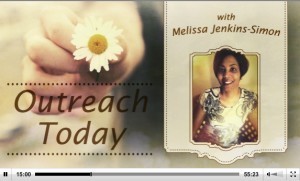 We took time out from holiday preparations for one last radio interview, which you can hear by clicking this link. My portion begins at about the 15-minute mark, but why not listen to the fellow before me, too. He's written a book as well. The following excerpt was my response when the host asked me to explain what is meant by the "pledge" to my son in the book's subtitle:
We took time out from holiday preparations for one last radio interview, which you can hear by clicking this link. My portion begins at about the 15-minute mark, but why not listen to the fellow before me, too. He's written a book as well. The following excerpt was my response when the host asked me to explain what is meant by the "pledge" to my son in the book's subtitle:
"I spoke about an objective earlier. The objective that we worked toward, that we got so excited about, was to try our very best to help him achieve a full recovery. Now, we knew the odds were against us. But it felt like something worth shooting for. It certainly motivated us, as opposed to being, to living in despair, which is what some folks that we knew were doing. So, um, we did not achieve total wellness. But we did achieve some wonderful things for him. And I don't want to minimize that. I think that his quality of life is substantially better as a result of it. And the pledge is that I'm still his advocate now. He's 26 years old. And I always will be."
December 5, 2011
Peak Reading Experiences of 2011
The idea for this list arose when someone directed me to a page where I could vote for the year's favorite books on the Goodreads website. It turned out that voting there was not an option, because I had no opinions about any of the entries. I'd heard of almost none of the nominated books in any category, and certainly had not read any. This may say something about the degree to which I am out of step with the kind of material that generates buzz.
I do, however, read quite a lot, and do try to stay up to speed with what's new and interesting. So I set out to create my own top ten list for the year (in no particular order). Most, but not all, of the titles that follow were published in 2011. In any event they're all recent, and I did read them in 2011.
Best legal fiction
Diary of a Small Fish, by Pete Morin
From my Goodreads review: "The dialog in this story is pitch-perfect and most of the characters entirely believable. … I was entertained, moved, even educated. I expect it to do well."
Best story of self-discovery
Becoming Patrick: A Memoir, by Patrick McMahon
From my Goodreads review: "This is a story about feeling isolated or cut off from what is needed to feel grounded in life (primarily, knowledge of who one's parents are), and about what it takes to overcome the real and imagined obstacles to bridging the divide."
Best collection of short stories
There Is Something Inside, It Wants to Get Out, by Madeline McDonnell
From my Goodreads review: "It isn't often that I reach the end of a book and immediately turn back to the beginning and start over. Granted, in this case that involves no big commitment, since the book is quite slim. Still, the number of pages is deceptive. There's a lot in here, and the telling is so lovely that I just wanted to appreciate it thoroughly."
Best travel memoir
Over the Hill and Far Away: One Grown-up Gap Year, by Jo Carroll
Travel writing is not so much about the places visited as it is about the interaction between the place and the writer. That's a given, I think, but even so there are variations in the degree of focus on place vs self. Travel also frequently involves venturing outside one's comfort zone. Jo Carroll illustrates her level of comfort during her explorations by the extent to which she can step outside herself and into the exotic locales through which she passes.
Best historical fiction
(To) Die a Dry Death, by Greta van der Rol
From my Goodreads review: "[The author] grapples with the question of what motivates certain characters, who'd previously seemed exemplary, to descend into depravity. She further suggests that at least some of those who retain their perspective and decency also have a dark side. I was reminded of essays on that subject by John Gardner and Ursula K. LeGuin (which it's probably time to revisit)." (I applaud the author's decision to modify the title of the ebook version with the infinitive verb form.)
Best mystery
Lake Charles, by Ed Lynskey
From my Goodreads review: "For someone who has lived many years in a major city, as I have, there's a latent wish to escape to the purity of an uncomplicated rural environment. Lakes Charles is the antidote for that, in the same way Deliverance was. In fact, I'm probably safe in saying that certain parts of this are a deliberate homage to Deliverance."
Best YA fiction
Smells Like Treasure, by Suzanne Selfors
I know about this book thanks to my daughter, who occasionally shares some of her faves with me. This one is just pure, unabashed fun. There is nothing wrong with that.
Best philosophical novel
Lying Awake, by Mark Salzman
From my Goodreads review: "This was a good one to read on the heels of The Power and the Glory, which I reread a couple weeks ago. Both novels concern hypervigilant, self-critical souls questing for God and unable to take comfort in potential signs of having made progress."
Best imaginary biography
Mrs. Nixon: A Novelist Imagines a Life, by Ann Beattie
As an acclaimed writer over a period of 35-plus years, Ann Beattie is in no need of my humble endorsement. However, this new book is much too original and thought-provoking to omit. The wife of President Nixon is selected as a subject, I think because she always chose to avoid the public eye and to remain in the shadow of her tragically flawed husband. The author acknowledges that such a subject is resistant to being truly and definitively pinned down, like a preserved butterfly, so she approaches it tentatively from a variety of angles and in a variety of voices and styles, somewhat reminiscent of what Joyce does in the "Cyclops" episode of Ulysses. It's primarily a meditation on how a writer can know anything with assurance.
Best actual biography
Twilight at Monticello: The Final Years of Thomas Jefferson, by Alan Pell Crawford
From my Goodreads review: "Having read this, I feel that I understand Jefferson far better than ever before. What I see is a man who didn't especially want to be in public life but who rose to the occasion far more capably than do most career politicians. I see an affable, generally cheery fellow who trusted people perhaps more than was wise but who remained relatively serene despite severe personal disappointments. I wouldn't call him a paragon, but my admiration for him has been enhanced, and to it has been added a kind of affection."
(Voting for my own book is unseemly, but I'm sure you'll understand that publication of What About the Boy? has to remain the top literary event of the year for me.)
November 29, 2011
November 28 Interview with Cecile Forte, PhD
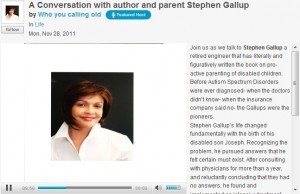 Today I enjoyed my 12th media interview concerning WATB. As occasionally happens, discussion took off in unexpected directions, so that I failed to make certain points that had felt important when starting out. On the other hand, these conversations have all been good experiences and have certainly kept me on my toes. Please click here for the audio. Excerpt below:
Today I enjoyed my 12th media interview concerning WATB. As occasionally happens, discussion took off in unexpected directions, so that I failed to make certain points that had felt important when starting out. On the other hand, these conversations have all been good experiences and have certainly kept me on my toes. Please click here for the audio. Excerpt below:
"I probably am the biggest winner in the family for the way that things have turned out. That's one reason why I titled my book What About the Boy?, because I keep trying to bring the focus back to him. Because he doesn't speak for himself and it's so obvious to me as I look at the story I've written that we can't avoid seeing things from our own perspective. And he doesn't really have a way of presenting his case. And so I'm trying to do that for him in writing the book."
November 26, 2011
November 21 Interview with Coach Marsha and Coach Jim
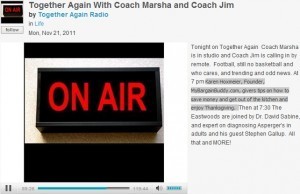 While away from home for the Thanksgiving holiday, I was interviewed for the "Together Again" program on blogtalk radio. Click here for the audio file and skip ahead to the 90-minute mark to hear my segment. (Dr. David Sabine, who interviewed me on a Texas radio station in September, is on just before me.) Excerpt below:
While away from home for the Thanksgiving holiday, I was interviewed for the "Together Again" program on blogtalk radio. Click here for the audio file and skip ahead to the 90-minute mark to hear my segment. (Dr. David Sabine, who interviewed me on a Texas radio station in September, is on just before me.) Excerpt below:
"[My son's] mother took it a lot harder than I did. To me, it was a matter of determination. I was gonna resolve this problem one way or the other, the best I could. I went to war with it. Didn't go to war with my son, mind you, I went to war with his condition. But my wife, his mother, took it personally. She felt there was something wrong with her, that she had produced a damaged child. And I think intellectually she understood that it wasn't logical to think that way. But she couldn't help herself. And that, plus the frustration of constantly battling this had the effect of making her ill."
November 15, 2011
Remembering It's a Marathon and Not a Sprint
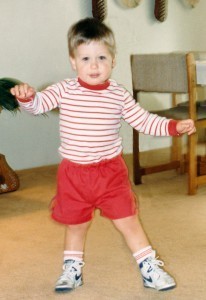
Two words for you today: Fear not. I type them in hopes that they won't make me sound too much like the heavenly messengers who show up in Scripture. Perhaps it will help to mention that I'm also, or mainly, addressing these words to myself. I think they need to be said because of the moods I occasionally fall into while striving to attain objectives.
All too often, the hoped-for results of that striving are slow in showing up.
How do you react when you have to wait?
There are times when something in me wants to go ahead and expect the worst. Putting aside gloomy thoughts is a lesson I must continue learning, over and over again, because what tends to happen then is that, just as I begin to sound like Eeyore, an unexpected event reminds me that the final results are not yet in.
This was often true during the campaign to help my son Joseph, described in WATB. Joseph would hit a plateau and stay there until I was wild with impatience. Then, for example, long past the point when it would have occurred if I were running the show, there'd be the sweet reward of something like his first steps (at 39 months). The same pattern is also taking shape with WATB itself.
Yesterday, as I stewed over the perception that WATB has been read by only a small number of people, and might never be read by many more, such an event occurred. I received an email from novelist Ann Beattie. She has read my book, and she offered the verdict that it's "excellent," "vivid," and "highly visual." I'm sure she would not have contacted me to say that if she didn't believe it to be true.
Two more words, for you and for me: Be patient. Let's try to avoid becoming discouraged. Let's avoid letting despondency be a competitor for our heart. That's an extra challenge on top of whatever we are doing to achieve our goals, but I think succeeding at it makes the rest of the process more fun.
Emotions like depression and anxiety boil down to our wanting to stay in control. Ultimately, we aren't. If we were, everything would be to our liking, and that's almost never the case. At least not for me.
There are times when we choose to go after something important. Many years ago, Judy and I set out to achieve quality-of-life improvements for our disabled son. More recently, I decided to preserve that experience in a memoir. Such choices must have integrity, by which I mean they should be motivated by the right intentions, guided by the best possible information, given shape by the highest quality of effort. So resolving to be patient is not abdicating responsibility to do what we can to obtain that good result. It's just recognizing the point at which our powers end—or at which we must wait hopefully for the outcome of what we have sown.
Two more words: When we have done all we can, let go. The end result may surprise us.
October 26, 2011
October 25 Interview on WGSO Radio
 Click here to open Jeff Crouere's Ringside Show on New Orleans radio. Then scoot the slider over to hour 3 to hear yours truly (excerpt below).
Click here to open Jeff Crouere's Ringside Show on New Orleans radio. Then scoot the slider over to hour 3 to hear yours truly (excerpt below).
"It so happens that Barnes and Noble displays this book in their 'Family and Childcare' section. I'm not sure that's the best category, because it's not meant to be instructional. I call the book a memoir. Ultimately, it's a story. It dramatizes my family's efforts to help our child. It shows consequences of an unconstructive doctor-patient interface. And it's about the broader experience of pursuing a goal when you don't have reliable guideposts. Now, families who are grappling with developmental disability, or chronic health issues of any sort, can certainly draw lessons from my story. But so far, most readers that I am aware of do not even have a personal connection with disability. They're describing this as "an emotional mystery novel," and they say that it reminds them to go hug their kids. They see it as a—well, as a reminder to appreciate the small things in life that we sometimes take for granted."
October 24, 2011
A Look Behind the Scenes
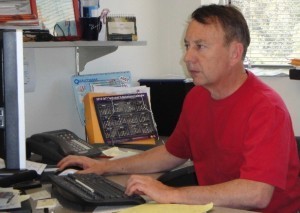
I thought I'd depart from the usual subject matter to offer a glimpse into the life of an unknown writer who, against all odds, is striving to promote his book.
Here's some of what I've been doing these last few days (not counting the efforts to keep my employer satisfied, my kids on the straight and narrow, and the sounds of disapproval from my spouse at no more than a low rumble).
Preparing for a radio interview Tuesday morning
Making a pitch to another radio outlet for an appearance on that show
Offering a copy of my book to a new reviewer
Contacting an autism researcher to comment on a presentation he's making at a conference
Exchanging emails with another autism researcher and sending him a copy of my book, just as an expression of gratitude for the important work he's doing
Critiquing a writer friend's draft short story
This evening I look forward to returning to the book I'm currently reading for pleasure, John Scalzi's Agent to the Stars. I read something else by Scalzi several years ago. My impression was that the idea behind that book was clever but the writing was uninspired. Based on that, I didn't expect too much from this one, but still wanted to see what he would do with the subject: Friendly aliens have hired a publicist to help them make a good impression when they introduce themselves to Earthlings. Before proceeding, they need some help overcoming a negative: Briefly, they smell bad.
I identified with the aliens' problem, since I am trying to present What About the Boy? in the best possible light. No, you will not find me saying that it stinks! Quite to the contrary, it's the best and most important thing I have ever written. But who am I? The world doesn't know, doesn't particularly care, and that's a major hurdle for anybody who has something to say.
Anyway, the first several pages of his book have been a very pleasant surprise. I read a lot but seldom get my hands on something that's funny. I'm very appreciative when I do, because laughter is healthy—even when it causes me to wake up a sleeping spouse, who then expresses the disapproval alluded to above.
If you like to read—and I hope you do, because this site is as much about a literary effort as it is about the campaign to address a kid's disability—then I'd be interested in knowing what kind of books you turn to for relaxation.
October 17, 2011
Five Facts for Fathers
 Last week, a group of dads belonging to the National Foundation for Autism Research honored me with an invitation to speak at their meeting. The online announcement said I would talk about my book, but I thought it would be more constructive to discuss a few parenting principles. I went in with a short list, and might've run out of things to say in just a few minutes. However, the audience was a public speaker's dream come true. Everybody was so engaged! All that constructive energy renews my hope that the prospect for our kids is improving.
Last week, a group of dads belonging to the National Foundation for Autism Research honored me with an invitation to speak at their meeting. The online announcement said I would talk about my book, but I thought it would be more constructive to discuss a few parenting principles. I went in with a short list, and might've run out of things to say in just a few minutes. However, the audience was a public speaker's dream come true. Everybody was so engaged! All that constructive energy renews my hope that the prospect for our kids is improving.
Anyway, these are the high points of what I said.
A child who is disabled is, first and foremost, still a child.
This may sound like a bromide, but what I'm recommending comes most easily when you are dealing with an apple-cheeked youngster who says cute things and gives you lots of great feedback. A child with problems that make him less than cuddly or responsive may inspire enthusiasm on your part for finding professional help. And that's great. However, he also desperately needs to be told, repeatedly, in every way, that he is loved and cherished. Kids who give you no eye contact, or who are rigid or combative, need this reassurance at least as much as anyone else. So in addition to being an advocate, be a daddy.
If your doctor doesn't take your concerns seriously, consider finding another doctor.
As noted previously on this blog, not all doctors are on board with the importance of early intervention, even today. If you find yourself dealing with someone from the nineteenth century, dump him. The next guy you see may be just as bad, but there are good doctors out there—people who know this. We parents owe it to our kids to find them. Remember: Whatever choice is made, we are the ones who live with the consequences.
Have extravagant goals for your kids.
Swing for the fences. If you strike out, at least you know you tried. Imagining a wonderful outcome is not the same as being in denial. Denial is excluding or ignoring information we need to attend to. It's pretending that everything is fine when things are not fine. Instead of that, I'm talking about doing everything we possibly can to turn the situation around. For me, the question has always been whether I was willing to relax and coast while knowing that there was something I might be doing that could make a difference. And I wasn't.
Choose your battles.
Initially, I meant to talk only about not letting other people rope you into promoting philosophies and causes that don't necessarily benefit your child. However, I spent most of my time talking about unwinnable confrontations with school districts. Everyone present had a lot to say on this topic, and this is where I learned the most. Because these days, parents who are prepared and who don't quit seem to be winning more often! And as for those causes, participation can be energizing. Well, yes, I did know that. Perhaps some of the lessons impressed upon me over the years have been incorrect. If I give this talk again, this point is the one to work on.
Stay balanced
This one almost seems to contradict the point about swinging for the fences. I think it's consistent if each of us applies common sense. Our families will not be helped if our own lives are ruined in the process of trying to overcome a chronic problem. We must take care of ourselves while we are taking care of our kids. And since I was speaking to a room full of dads when I said this, I referred to a guest blog post from last summer and finished by recommending hugs for wives as well as for kids.
October 11, 2011
Controversies

I originally wrote this item for another website, which subsequently took it down without notice. Maybe it was too controversial.
The other morning, Susie, my 11-year-old, mentioned that her teacher told the class that she'd first learned to read via the so-called whole-word approach, which of course is now very much out of favor. I told Susie that "whole word" probably describes the method I used many years ago in helping her disabled older brother learn to read.
Back in those days, I got my guidance from Glenn Doman, author of Teach Your Baby to Read and founder of a highly controversial clinic for treating brain-injured kids. My son Joseph did learn to recognize words via this method, although that skill never progressed to a functional level. Whether the problem lay in the method or in his capacity to learn (or my own capacity to teach) is still open to debate.
I also told Susie that, if the past is any indication, phonics may in due course drop out of favor as well, either to be replaced by something new or by a return to whole-word. I have no argument whatsoever against phonics. My point is just that there will always be warring factions, most especially when it comes to matters of education and child-rearing, and progress seems to occur along a zigzag path.
Nothing brings the divisions into focus more sharply than the experience of raising and advocating for a developmentally disabled kid. I could go on all day listing the topics people fight about here.
Which is better, segregated special education classes or total inclusion/mainstreaming?
What about vaccines? Are they a greater danger than the diseases they guard against? If so, is the problem only one or two vaccines, or the accepted schedule for giving them, or are they all suspect?
What about terminology? Is it worthwhile to object when you hear a word like "retarded?" If so, what's a better term? Challenged? Differently abled? Special-needs?
Should kids with developmental disabilities be helped to improve, to be made more like the rest of us, or are they just fine the way they are?
The above questions barely scratch the surface, but it would surprise me if you did not feel a strong reaction to at least one of them. Even in the best of circumstances, parenting can sometimes be scary; and you can multiply the scare factor by a hundred when disability is involved. We want to believe that we have a handle on things, some semblance of control. If we don't have that, how can we hope to give our kids the security and opportunities they deserve? And so we quite naturally look for justifications that will enable us to take positions with some confidence.
Over the long haul, however, there are trends and counter-trends in most if not all of these controversies. Just as in whether to teach reading via whole-word or phonics.
And yet, the fact that we may one day view things differently doesn't mean we're not entitled to opinions now. Of course we are. Because we have to make choices now. But somewhere along the line, I noticed something about myself. As the parent of a disabled boy, I had certainly formed strong opinions; and my concern for him, and my pent-up frustration with the limited opportunities available to him, had created in me a sort of righteous indignation that could burst forth when I encountered views contrary to my own.
Maybe now and then it's healthy for us to let off steam in such cases. On the other hand, I wonder whether taking up the banner of a cause, any cause, really benefits our kids. After all, they are what this is all about. We adults are going to disagree over one thing or another, and maybe we need to accept that.
October 3, 2011
October 1 Interview on KCAA Radio
Click here to listen to a lively 30-minute interview with host Douglas Gibbs. (my portion begins at the 11:20 mark.)
"I appreciate the fact that you're comparing this to a detective story, because that's really what it felt like. You know, in classical detective stories you've got a private eye, and typically he's butting heads with the law enforcement. They're not on the same team. More often than not, the law enforcement people are just about ready to arrest the private eye, instead of going after the real bad guy. And that's kind of how it felt. We were—and we didn't want this! We did not want to be butting heads with the doctors. We wanted to be on the same team with them."




